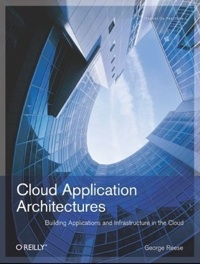Okay, not everyone can pull this off. But one experienced Minneapolis tech entrepreneur, George Reese, is doing it in a big way with a new book on "cloud computing." What's cloud computing, you ask? Did you just come out from under a rock? If you're involved in any way in IT, even on the fringes of it, you've been blasted for months with an almost endless amount of media coverage and discussion about this topic — a recent example being on the front page of The Wall Street Journal the other day. Even most casual Internet users are now aware that many of their consumer web apps are accessed "in the cloud," as opposed to being software they install on their own computers. Google's Gmail is probably the best known example of that.
George Reese is cofounder of a new Minneapolis startup, enStratus,  and is right smack in the middle of all the buzz.
and is right smack in the middle of all the buzz.
Thanks to his new book, which he worked on for six months, he's in a great position to help clear the air surrounding a lot of the cloud computing hype that's flying around out there now. He's especially interested in helping enterprises that are looking to take advantage of the economic benefits of this form of corporate IT.

On April 10, George's new book will be released by O'Reilly Media: "Cloud Application Architectures: Building Applications and Infrastructure in the Cloud." And here's the Amazon link. It's now available at both these links for pre-ordering. I've known George since 2006, in relation to his previous startup, Valtira (a SaaS marketing platform), from which enStratus is being spun out. (I also know David Bagley, the CEO of Valtira, who's the other cofounder of enStratus.) I thought it would be fun to get George's thoughts about this uber-hot topic of cloud computing, and hear the story behind his book. This is an interview I conducted with him earlier this week, which first appeared on the cloud computing site Cloud Ave. and, later, on our own Minnesota tech news site, Minnov8.
Graeme: How long have you been involved with cloud computing, and what made you decide to write this book?
George: I suppose that depends on what you mean when you say "cloud computing." I've been developing SaaS systems for the past five years, but got into Amazon Web Services and Infrastructure as a Service in late 2007 when my company Valtira needed an alternate approach to a high-availability infrastructure. During this time, I've developed a body of experience in putting transactional database applications into the Amazon Cloud. My editor at O'Reilly, with whom I've written several books in the past, heard I was doing cloud work and asked me to put together a book on the subject.
Graeme: Why is cloud computing gaining adoption like it is? What is its attraction? We know Internet and IT startups love it, but do you think it will catch on in any significant way with larger enterprises?
George: The primary attractions to cloud computing are cost and flexibility. Cloud computing enables you to build out a world-class IT infrastructure with no up-front capital investment and pay for the growth of your infrastructure as the business it is supporting grows.
I believe enterprise IT has a strong need for the benefits of cloud computing, but they have higher expectations with respect to reliability and scalability than startups. My company enStratus is all about dealing with these two concerns for enterprise IT, and I talk a lot about that in the book.
Graeme: For what types of readers did you primarily write the book? What will they get from it that they can't get elsewhere?
George: The book is for people tasked with making the move into the cloud and guiding them through that move. I start by establishing what the cloud means from my perspective and what its value is to an organization. The book covers how you evaluate what makes sense to move into the cloud and, once the decision is made, the security, availability, and disaster recovery planning necessary to operate at an enterprise level in the cloud.
Graeme: Do you deal in the book with the issue of choosing a cloud computing provider? In not, why not? Do you attempt to compare providers?
George: No. Anything I might say in the way of a comparison would be out of date by the time the book hit the shelves. Jeff Barr from Amazon reviewed the book for technical accuracy, and E.J. Johnson from Rackspace and Randy Bias from GoGrid both provided appendices describing their offerings.
Graeme: What are some of the other key issues you deal with in the book, such as security and reliability of the cloud? And what does the book deliver that's not available elsewhere?
George: Given my role at enStratus, cloud security and reliability are obviously key concerns of mine. I spend an entire chapter on security issues and cover how to architect your applications for maximum availability throughout the book. I have not seen much of this kind of talk available on the Internet; mostly warnings about how security and availability are things you should worry about.
Graeme: Readers of the book will also learn about the management tools you have developed for use in your own company, Valtira, which offers a SaaS marketing platform. Please tell us how those tools led to the formation of a separate, spinoff company.
George: Valtira was looking to build out a new service offering that required a high-availability infrastructure. We priced out a managed services infrastructure to support our needs, but that proved too costly for a new product offering. We then turned to the Amazon cloud to see if it would meet our needs. We ran into a number of obstacles along the way. Some of these obstacles have since been addressed by Amazon through new service offerings like Elastic Block Storage. For other obstacles, we built out tools to take care of things. It turns out that people who were not Valtira customers really wanted our tools, so we spun them out into enStratus.
Graeme: You began working on the book many months ago. The release of the book seems now to be right at a time of intense focus on cloud computing, undoubtedly driven in part by current economic conditions. What's your take on all the hype?
George: Cloud computing is the most disruptive technology to hit business since the Web. It's not hype. Like any disruptive technology, however, there's a lot of misinformation flying around. To make matters worse, every person has a different internal definition of "the cloud" that frames their discussions on the subject. So, the hype is warranted, but everyone needs to pay particular attention to context and definitions in their discussions.
Graeme: With the book's release, your speaking schedule is naturally heating up. Please tell us where people can find you in coming weeks and months.
George: Well, first, I'll be presenting at CloudCamp in New York City on April 1. Following that, O'Reilly has a webcast on "Getting Started with Amazon Web Services" scheduled for April 8. In Minneapolis, I'll be speaking at the Minnesota High Tech Association's spring conference on April 15, and then at CloudCamp Minneapolis/St. Paul on April 18 at the U of MN. Recently, my company enStratus was chosen as a presenting startup at the Under the Radar conference in Mountain View, CA, on April 24. The following month, I'll be speaking on the topic of information privacy and security in the cloud at the Glue Conference in Denver on May 12. Then it's off to London, where I'll be speak on May 15 at WebTech Exchange 2009 on the topic of hardening an EC2 infrastructure.
Graeme: That definitely qualifies as a whirlwind, George! Thanks for taking some time to tell us about your book, and I look forward to seeing you at some of these upcoming events.
By the way, follow George on Twitter @GeorgeReese and his company's tweets @enStratus.
(Disclosure: the author has a consulting relationship with enStratus.)

Leave a Reply